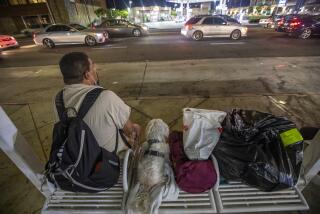No longer an isle unto themselves
- Share via
MERCER ISLAND, WASH. — Karisa Vaughn, a college student who hasn’t had a permanent home in months, hoisted a tattered wooden pallet over her shoulder Tuesday while several other homeless men and women lifted heavy cinder blocks, pounded fence posts and hauled in their personal belongings in garbage bags.
The setting for this modern-day Hooverville for the chronically unemployed and transient -- constructed not without a dose of well-heeled hand-wringing -- is Mercer Island, an enclave of CEOs, professional athletes and Microsoft millionaires that is reached by bridge.
The new neighborhood is known as Tent City 4. It will reside for three months on property owned by the local Methodist church, which prevailed last week in a tough legal battle against residents.
“I knew there was going to be controversy,” said the Rev. Leslie Ann Knight, who helped spearhead the move. “I didn’t realize it would be so intense.”
Mercer Island, a tree-carpeted retreat in the middle of Lake Washington, has 22,000 residents and a median housing price of $1.2 million. Access to the less tony cities of Seattle and Bellevue, on either side, is by bridges that drop into a tunnel when they hit Mercer, should outsiders find the need to pass through.
Residents include Microsoft co-founder Paul G. Allen, Seattle Mariners Chief Executive Howard Lincoln, retired Boeing CEO Frank Shrontz, the publisher of the Seattle Times and ex-NBA great Bill Russell.
The homeless encampment is one of several temporary shelters that have been set up around King County in recent years, but none of them were in as wealthy an area as Mercer Island.
A neighborhood group quickly filed for an emergency injunction, complaining that the encampment would be a nuisance that would force nearby residents to “look at honey buckets, temporary shower facilities [and] tents.”
But a judge last week shot down the lawsuit, clearing the way for Tuesday’s move.
Seattle is widely seen as a socially progressive city devoid of some of the worst urban ills of metropolises like Los Angeles and New York. But about 8,400 people in King County are homeless, according to a recent survey by the Seattle/King County Coalition on Homelessness.
That is barely a 10th of the number in Los Angeles County, but a reflection, homeless advocates say, of the robust economy in Seattle that has sent housing prices soaring while wages have lagged behind.
Knight said she is convinced that most Mercer Island residents support the plan to aid the less fortunate. “For three months, what they are asking for is ground. What we are giving them is hospitality,” she said.
City officials crafted an agreement with the church over the camp, rather than “spend thousands of dollars” trying to fight it, said Joy Johnson, the city’s communications director.
Previous lawsuits seeking to prevent churches from hosting similar camps have failed on 1st Amendment grounds.
But the neighborhood group that challenged the new camp, Mercer Island Citizens for Fair Process, argued that the camp would violate zoning laws. Other jurisdictions have ruled that churches do not have a right to supersede city zoning, said Jane Ryan Kolar, the attorney for the homeowners group.
Tent camp organizers say most residents stay in camp for only about six weeks. Residents must have valid identification and pass a criminal warrants check. Drinking and fighting are prohibited.
Vaughn, 34, said she moved to the Seattle area from Denver to enroll in college but found herself unable to pay both school fees and rent. “Living in a tent city is not ideal,” she said. “But without it, I would be sleeping outside, by myself.”
Dennis Peters, 57, said he had lived in missions and under freeway bridges before joining the Tent City camps over a year ago. “When you are homeless, there’s very little expectation of privacy,” he said. “The first time I was here, just having my own tent was huge.”
Some Mercer Island residents are ready to give the homeless the benefit of the doubt -- and predict that residents may emerge the better for it. “This exposes us to poverty and humankind,” said Bob Hughes, a member of the church, “in ways most of us residents on the island choose not to confront.”
--
More to Read
Sign up for Essential California
The most important California stories and recommendations in your inbox every morning.
You may occasionally receive promotional content from the Los Angeles Times.










